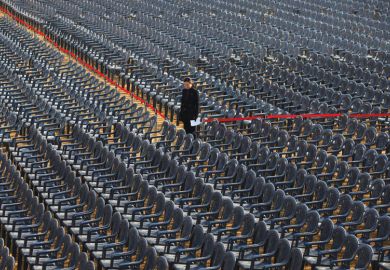South Korea’s government has narrowed down the list of universities to be supported under its forthcoming multibillion-won excellence initiative, meant to encourage bold innovation in the sector amid sharp demographic decline.
The “Glocal” initiative – its title amalgamating “global” and “local” – is intended to boost regional universities hit hard by the country’s falling population, especially those outside the capital of Seoul, some of which have already been brought to the brink by dropping enrolments.
Korea’s government has shortlisted for funding 15 proposals comprising 19 universities. Seoul is expected to announce 10 finalists in the autumn, with each project getting 100 billion won (£60 million) over five years. The initiative will reportedly fund up to 30 universities by 2027.
With its goal of shoring up the higher education system and addressing weaknesses, the South Korean scheme has parallels to Japan’s ¥10 trillion (£55 billion) excellence initiative – a competitive programme that rewards a few top universities with substantial financial resources to support their continued growth, the winners of which are to be announced in the autumn.
In a marked contrast, however, the Korean initiative seeks to boost the sector more broadly, channelling funding into institutions outside the troika of the top “SKY” universities – Seoul National University, Korea University and Yonsei University.
Competitors for the funding have proposed radical changes to their structures and operations, with the breakdown of traditional departmental boundaries a theme in many proposals. Pohang University of Science and Technology (POSTECH) said it would scrap departments; Soonchunhyang University said it would abolish 10 colleges and 50 majors in favour of four “universities”, with faculty unaffiliated to departments.
Dong-No Kim, a chemistry professor at Yonsei, said the scheme demonstrated that policymakers believe that local universities can compete with their peers in Seoul. The initiative rightly encourages the “fusion” of ideas from different disciplines, he said, but he expressed scepticism that truly radical change would be delivered.
“It is still doubtful whether universities could successfully eliminate these obstacles, since most professors oppose the elimination of the department system,” he said.
Others have also praised the general thrust of the initiative.
“A feature of governance in general in Korea, and higher education governance in particular, is regional and sectoral equity and balance – not just the leading cities and their institutions are important,” said Simon Marginson, a professor of higher education at the University of Oxford.
He noted the need for regulatory “determination” to ensure that lower tier institutions were of good quality.
Another researcher, who requested anonymity because of his involvement in the initiative, said there was broad recognition of the need for change in the sector, given the demographic pressures facing universities. While there had been some pushback from scholars over more radical moves, such as doing away with departments, there was increasing consensus on the need for change, he said.
“Even Korean academies – universities and academic professions – believe something needs to be done to assure the quality of higher education,” he said.
Sangwoo Lee, a research fellow at the UCL Institute of Education, said universities would need to change to “survive in the era of a fast-changing labour market and decreasing school-age population”. The initiative aims to address that, but if it is to succeed, the government will need to put more thought into the local labour market, he said.
“It would be important to have better jobs in local areas where graduates from those ‘Glocal’ universities would work. If those graduates move to Seoul after finishing their studies, the impact of the ‘Glocal’ universities scheme…would be somewhat limited.”
Register to continue
Why register?
- Registration is free and only takes a moment
- Once registered, you can read 3 articles a month
- Sign up for our newsletter
Subscribe
Or subscribe for unlimited access to:
- Unlimited access to news, views, insights & reviews
- Digital editions
- Digital access to THE’s university and college rankings analysis
Already registered or a current subscriber?








